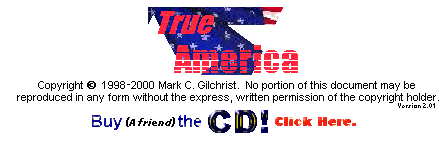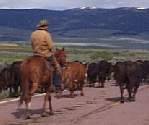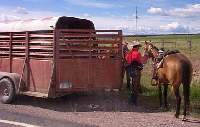At Home on the Range

|
Here, the land is a quiet plain, rolling gently across your horizon, and rising into peaceful mountains; the Bitterroot Range to your west, and the Snowcrest and Tobacco Root far to your east. Painted a mixture of sagebrush green and dirt brown, the land is so full of wide-open, that man has not been able to name it completely. When asked, you can't just give your address, you have to describe it, as in; "we're west of Dillon and east of Jackson." You are in a no-man's land, in a refuge, and you live and work, and work and live, and you do nothing to stop the land from taking over your life, from mixing with your blood until it contains dust .01 over the legal limit, and you will stay there until they carry you away.
Chadd Holland grew up on this land, he grew up on ranching, and he works about 2,000 head. This land and this way of life has gotten into his blood pretty thick, and he'll be one they carry out. "Cattle ranching is about all I know," he says. None of his three sons (all of whom have college degrees) seems to want to take over the ranch. "There's not much profit in ranching," Holland says. "It's just a way of life - we're doing it to survive." He says that his worst competition is from Canada, especially since the NAFTA was enacted. If no one in the three generations after Ben Holland wants the ranch, it might follow the same demise as many ranches in Montana; It could be parceled up and sold as "Montana ranchland" in ads in the backs of country magazines.
Two people who are still interested in ranching are Holland's nephews; Boyce and Brent Munday, who, with Brent's wife, Sally, are helping out on the trail ride today. "I'd rather work on a ranch, with cattle, than with people," says Brent, showing some of his Montanan spirit. Both Mundays have two children, none of which have shown much interest in ranching. Of the 15 grandchildren which Ben Holland has, very few seem to want to pick up the branding iron. It could be that they have greater opportunity to work elsewhere, or it could be the increasing government involvement. "Anymore, it's harder to fight the bureaucracy than fixing the fence or moving the cows," says Boyce Munday. And the logistics are difficult even within the family. No longer do you just hand down the ranch to the eldest son. Ben Holland's ranch is intricately divided between his two-dozen heirs, creating more paperwork than it took to found the state of Montana. "Oh yes," says Chadd Munday. "It's like a corporation."
Most people on ranches today also work elsewhere. Sally Munday works at the college, others will train horses for sale, Verna Holland is a taxidermist and the Mundays also raise bison and elk. The sun makes a long, hot arc across the Montana sky, as 82 year-old Ben Holland does his chores for another day. Chadd Holland tells me why his father refuses to retire, after more than 60 years as a rancher. "He says; 'If I quit, what good am I?'" He would like to see his children enjoy the same passion for their career as his father has. "I'd like them to stay here and keep it going," he says. "But I don't know if the future's here or not." Working as a rancher is not just a job, but a life, and around here, your life is about raising cattle on this incredible land, and you continue that life until the day they carry you out of here.
|

Family Unit - Sally, Brent and Boyce Munday, and Chadd Holland.
Check out the True America Made in the USA Archives
Return to our MAIN page


 "Movie stars come here, and they don't like to see the mess in the road,
"Movie stars come here, and they don't like to see the mess in the road,

 Loading horses on the trailer for the ride home. Cows are trailed only a few miles each day, and the cowboys sleep at home.
Loading horses on the trailer for the ride home. Cows are trailed only a few miles each day, and the cowboys sleep at home.
 Chadd Holland raises bison, which produces; wool, meat, horns, hide and a handsome mount.
Chadd Holland raises bison, which produces; wool, meat, horns, hide and a handsome mount.